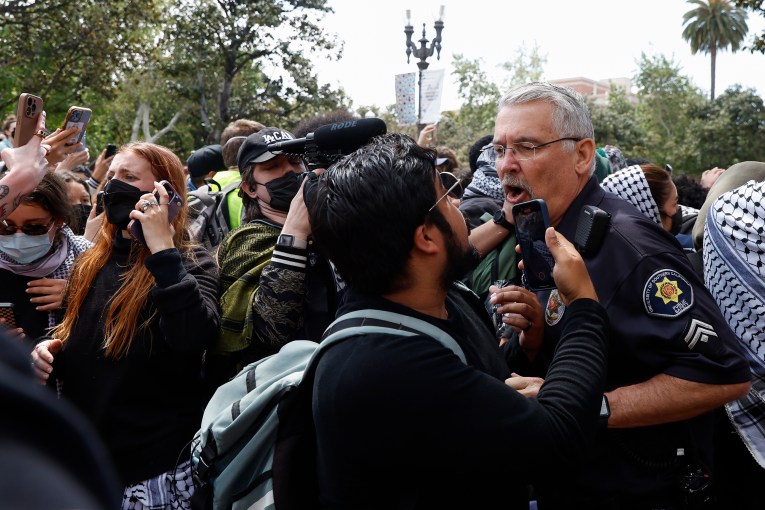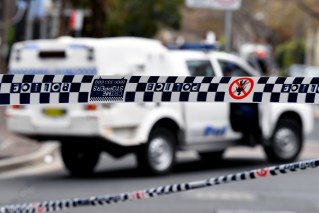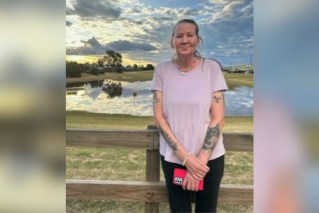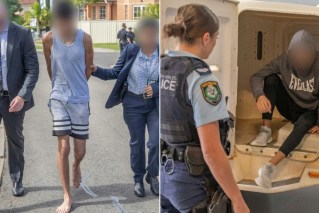Russia has claimed victory in the frantic global search for a coronavirus vaccine, but Australian experts are already dampening expectations that the COVID crisis could soon be over, warning the unproven treatment is far from a guaranteed silver bullet.
Australian health officials admit they know “very little” about Moscow’s alleged breakthrough so far, and are waiting for more independent data before passing judgement.
President Vladimir Putin made the surprise announcement on Tuesday night (AEST) that Russian researchers had made a breakthrough in coronavirus vaccine research.
He said Moscow’s Gamaleya Institute had developed a jab to innoculate against the deadly infection.
“I know that it works quite effectively, forms strong immunity, and I repeat, it has passed all the needed checks,” Mr Putin said, claiming even one of his own daughters had received the Russian vaccine.
However, despite the bold assertions from Moscow, the Russian vaccine has not yet gone to a “phase-three” trial, where it would be administered to many human volunteers to test its results.
The World Health Organisation said it was “in close contact with Russian health authorities” but that there would need to be “rigorous review and assessment of all required safety and efficacy data” before it could be rolled out widely.
In Australia, national discussion has turned in recent days to the hunt for a vaccine. Many dozens are in development worldwide, and Australia is said to be positioning itself at front of the line for some promising candidates.
On Tuesday, acting chief medical officer Professor Paul Kelly said “it’s not going to be years” before a vaccine – and that some of the dozens of candidates were “getting quite close” to useful test results.

Dr Nick Coatsworth. Photo: AAP
On Sunday, deputy chief medical officer Dr Nick Coatsworth said several vaccines were in human trials in Australia, calling progress “very exciting”.
However, the WHO has also said a vaccine may “never” come.
The New Daily asked Dr Coatsworth about the Russian vaccine claims on Wednesday afternoon.
“We know very little apart from the media reports, of course,” he said at a daily press conference.
Dr Coatsworth said he hoped the vaccine data would be “openly available for scrutiny”, and stressed that safety regulations and efficacy studies would be needed before Australia looked at it more closely.
When asked what Australia would do if two or more promising vaccine candidates became available at the same time, as has been flagged as a possibility with several in advanced testing phases, the DCMO said responses were still being worked out.
“These processes aren’t entirely established,” Dr Coatsworth said, but added that any vaccine would need to pass “robust” regulatory checks.
“Once the phase 3 trial results are in, if there is two successful vaccines, we would call for those to be available to every nation in the world.”
On Wednesday, chief executive of the CSIRO, Dr Larry Marshall, said the national science agency had assessed 200 possible vaccine candidates, in collaboration with the global Coalition for Epidemic Preparedness Innovations.
“We’ve done it in partnership with just about every university and medical institution in the country and globally with CEPI,” he told the National Press Club.
“Eighty per cent of vaccines fall over before they get to save lives. We’re focused on finding the vaccines that can deliver.”
Other Australian experts have hosed down hopes the Russian vaccine – the first to be widely claimed as a safe option – is guaranteed to work, or will be rolled out locally anytime soon.
Indeed, it has been slammed as dangerous.
“Reckless is the mildest word you can use for the decision of the Russian authorities,” said Melbourne University immunology professor Jose Villadangos.
“In effect they are testing an experimental vaccine without proper controls in a human population.”

Acting chief medical officer Professor Paul Kelly said many vaccines were “getting quite close”. Photo: AAP
Professor Villadangos said there was “significant” danger in Russia’s actions.
“The Russian authorities are taking enormous risks with a vaccine on which the scrutiny is going to be very high, and a failed outcome will be detrimental for the development of other COVID vaccines around the world,” he said.
Professor Magdalena Plebanski, a vaccine and immunology expert at RMIT University, said many questions remained about how the Russian vaccine was tested.
“It is difficult to know without further information how safe or effective this new vaccination strategy is,” she said.
“If the initial small trials were only done in healthy adults, how would this vaccine protect and affect older adults, who have a different immune system from younger adults?”

Many vaccines are moving to human trials. Photo: AP
Dr Roger Lord, a medical sciences lecturer at the Australian Catholic University, also raised concerns about the lack of large-scale trials.
“Russia has announced the approval of a COVID-19 vaccine based only on responses in a limited number of individuals and before larger phase three trials have been undertaken,” he said.
Dr Lord claimed the announcement, and even the name of the vaccine – dubbed ‘Sputnik V’, after Russia’s pioneering space satellite – could be a “propaganda exercise”.
“Clinical trial data for the Russian vaccine is not available for scrutiny so it is difficult to verify claims of safety or possible adverse effects and suspect more harm will come from this approach than progress to control SARS-CoV-2.”









